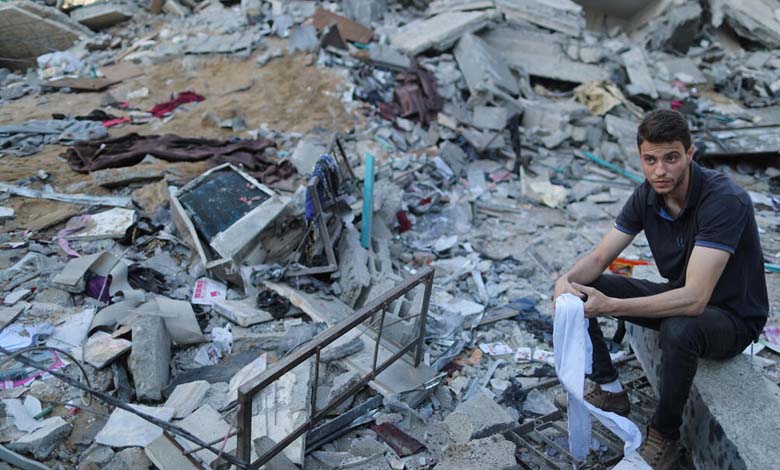Secret U.S. Report: Hundreds of Israeli Violations in Gaza Under Investigation

A new report revealed by The Washington Post accuses Israel of human rights violations in Gaza.
According to a secret report from a U.S. government oversight agency, Israeli military units have committed “hundreds” of potential violations of U.S. human rights law in the Gaza Strip, which the State Department may take “several years” to review, according to U.S. officials who shared the details with The Washington Post.
-
Vance Tackles Thorny Issues in Gaza: Hamas’s Arsenal and Reconstruction
-
Gaza Truce: Israel identifies a body as U.S. diplomatic efforts intensify to sustain calm
The findings of the Inspector General’s office at the U.S. State Department mark the first time an American government report officially acknowledges the scale of Israeli actions in Gaza covered by the Leahy Law, a historic legislation that prohibits U.S. security assistance to foreign military units reliably implicated in gross human rights violations.
U.S. officials who discussed the report’s details on condition of anonymity due to its classified content said the oversight body’s findings raise questions about accountability for Israel, given the large number of incidents and the nature of the review process applied to the Israel Defense Forces.
-
The recent escalation in Gaza: will it accelerate international oversight of the truce?
-
Serious truce violation: Israel strikes Rafah after vehicle targeted in Gaza
Charles Blaha, a former State Department official in charge of Leahy law enforcement, informed of the report, said: “What worries me is that accountability will be forgotten now that the noise of the conflict has subsided.”
The Inspector General’s office declined to comment but acknowledged the report’s existence on its website.
The site states: “This report contains classified information and is not available for public inspection.”
The State Department and the Israeli army did not respond to requests for comment.
-
The Gaza Agreement: The Rafah Crossing and Remains Issue Await U.S. Mediation
-
Trump announces the start of Phase Two of the plan to end the Gaza war: pathway and obstacles
The report was finalized just days before Israel and Hamas entered a ceasefire agreement that led to the release of remaining Israeli hostages in exchange for Palestinian prisoners, a partial Israeli troop withdrawal, and the resumption of some humanitarian aid to war-torn Gaza.
Although the ceasefire is still technically in effect, last Tuesday was the deadliest day since the agreement, with at least 104 Palestinians killed by Israeli airstrikes, according to local health authorities, after Israel accused militants of killing an Israeli soldier.
The Leahy Laws are named after former Senator Patrick J. Leahy (D-Vermont), who sponsored the legislation imposing sanctions on foreign military units receiving U.S. funding that engage in extrajudicial killings, torture, and other atrocities.
-
Hamas bullets dictate the ceasefire in Gaza… as international pressure mounts for disarmament
-
Hamas executions in Gaza: consolidation of power or elimination of rivals?
Israel’s ongoing two-year military campaign in Gaza, which has killed nearly 70,000 Palestinians since Hamas’s surprise attack on southern Israel on October 7, 2023, serves as a test of the Leahy Law’s effectiveness.
According to The Washington Post, numerous notable incidents in Gaza are still under review, including the killing of seven World Central Kitchen workers by Israel in April 2024, and the deaths of more than 100 Palestinians with 760 injured near aid trucks in Gaza in February 2024, according to local health authorities.
The administration of former U.S. President Joe Biden referenced these two incidents in a report to Congress last year, stating that the United States had not yet reached “final conclusions” on whether U.S. weapons were used in the killings.
-
Massive destruction as thousands of displaced Palestinians return to Gaza
-
A Complex and Secret Operation: Behind the Scenes and Timing of the Hostage Exchange in Gaza
The U.S. provides at least $3.8 billion in aid to Israel each year — and in recent years tens of billions more — making Israel the largest cumulative recipient of American aid in the world.
The secret report explains the protocol for reviewing human rights violations by foreign militaries receiving U.S. aid, according to U.S. officials.
In Israel’s case, the report shows how the specially designed bureaucratic process, established by successive Republican and Democratic administrations, gives Israel an advantage over other countries facing similar human rights allegations.
-
Gaza After the Truce: Total Destruction and a Return Amid the Rubble
-
Between War and Reconstruction: How Can Gaza’s Economy Rise from the Rubble?
The report states that the protocol, known as the Israel Leahy Verification Forum, involves senior U.S. officials and a longer process than reviews for other countries.
Under routine scrutiny procedures, the objection of a single official can block assistance to a military unit, according to Josh Paul, former State Department official and critic of U.S. policy in the Middle East.
For Israel, Paul said a U.S. working group must “reach consensus on whether a gross human rights violation occurred.”
-
Morning of truce… Gaza bids farewell to war
-
The War Winds Down in Gaza as Israel Begins Gradual Withdrawal
The Biden administration has faced criticism for refusing to suspend aid to Israeli units accused of gross human rights violations, including the unit involved in the death of Omar Assad, 78, a former Milwaukee grocer, detained at a West Bank checkpoint in 2022.
The Israeli army stated at the time that Assad suffered a heart attack from stress after being restrained, gagged, and detained by Israeli forces, adding that his death resulted from “moral failure and poor decision-making” by the soldiers involved.
Although members of the Israeli unit ultimately faced no criminal sanctions, the Biden administration said it was satisfied with the measures taken by the Israeli government, noting that the individuals involved no longer serve in the army.












